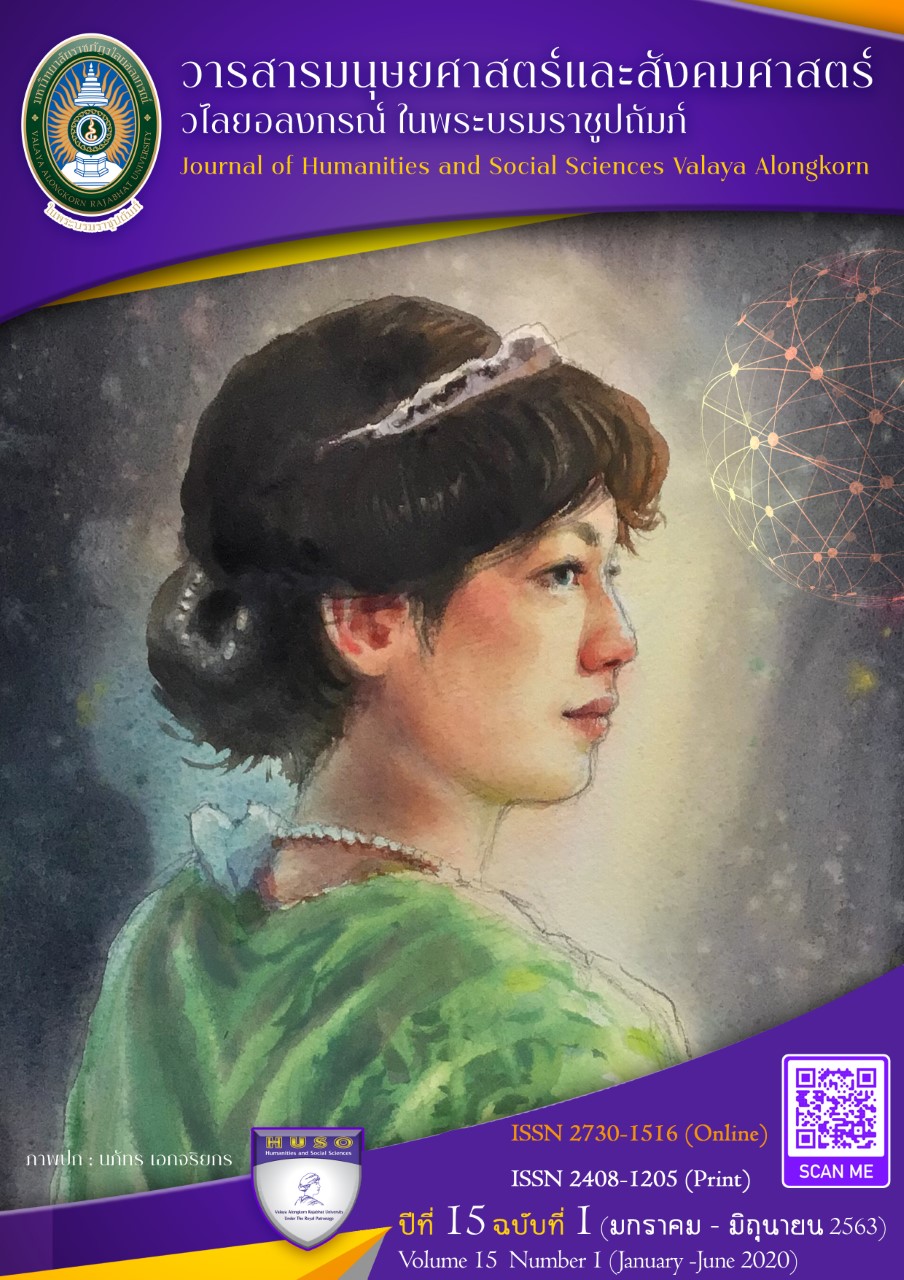THE EFFECTIVENESS OF SERVANT LEADERSHIP DEVELOPMENT PROGRAM IN COMMUNITY DEVELOPMENT VOLUNTEER LEADERS
Main Article Content
Abstract
The purpose of this research was to study the effectiveness of servant leadership development program in community development volunteer leaders. The research methodology was Quasi-Experimental using one group pretest-posttest design. The participants were 20 people in Nonthaburi Province. The research instruments were (1) the servant leadership development program in community development volunteer leaders of 4 times, 6 hours in each time, (2) servant leadership test. (3) After Action Review: AAR include The three parts of reflection are What did you learn? How do you feel? And How can you use it? and (4) Follow-up after 1 month of joining the servant leadership development program in community development volunteer leaders
by interviewing. The statistics used for data analysis were the mean, standard deviation, comparing the average of t-test by using a Paired sample t-test. The results showed that that volunteer community leaders before joining the servant leadership development program were in the moderate level and volunteer community leaders after joining the servant leadership development program have a high level of servant leadership. Community development volunteer leaders who participated in the servant leadership development program had significantly different leadership at the .001 level. (t=-6.80,
P ≤ .000) Therefore, this research showed that servant leadership development programs for community development volunteer leaders were able to develop higher level of servant leadership.
Article Details
ลิขสิทธิ์บทความวิจัยที่ได้รับการตีพิมพ์เผยแพร่ในวารสารมนุษยศาสตร์และสังคมศาสตร์ วไลยอลงกรณ์ ในพระบรมราชูปถัมภ์ ถือเป็นกรรมสิทธิ์ของคณะมนุษยศาสตร์และสังคมศาสตร์ มหาวิทยาลัยราชภัฏวไลยอลงกรณ์ ในพระบรมราชูปถัมภ์ ห้ามนำข้อความทั้งหมดหรือบางส่วนไปพิมพ์ซ้ำ เว้นแต่จะได้รับอนุญาตจากมหาวิทยาลัยเป็นลายลักษณ์อักษร
ความรับผิดชอบ เนื้อหาต้นฉบับที่ปรากฏในวารสารมนุษยศาสตร์และสังคมศาสตร์ วไลยอลงกรณ์ ในพระบรมราชูปถัมภ์ เป็นความรับผิดชอบของผู้นิพนธ์บทความหรือผู้เขียนเอง ทั้งนี้ไม่รวมความผิดพลาดอันเกิดจากเทคนิคการพิมพ์
References
กรมการพัฒนาชุมชน. (2559). คู่มือ สนับสนุนการปฏิบัติงานผู้นำอาสาพัฒนาชุมชน (ผู้นำ อช.). กรุงเทพฯ: สำนักงานเสริมสร้างความเข้มแข็งชุมชน.
สำนักงานพัฒนาชุมชนจังหวัดนนทบุรี. (2556). คู่มือการปฏิบัติงานผู้นำอาสาพัฒนาชุมชน. ถ่ายเอกสาร.
ศิริวรรณ จันทรรัศมี (2558). การพัฒนาหลักสูตรฝึกอบรมภาวะผู้นำแบบผู้รับใช้สำหรับผู้บริหารสถานศึกษาเอกชน จังหวัดชลบุรี. ปรัชญาดุษฎีบัณฑิต สาขาวิชาการบริหารการศึกษา มหาวิทยาลัยบูรพา.
Greenleaf, R. K. (2002). Servant Leadership: A Journey into the Nature of Legitimate Power and Greatness. 25thed. Paulist Press.
Klein, M. C. M. (2006). Leaders of Effective Volunteer Organizations: Their Character, Practice and Transformational Style. ProQuest Dissertations Publishing.
Palumbo, R. (2016). Challenging Servant Leadership In The Nonprofit Sector: The Side Effects Of Servant Leadership. The Journal of Nonprofit Education and Leadership.
Ronquillo, J. C. (2010). Servant, Transformational, and Transactional Leadership. Leadership in Nonprofit Organizations: A Reference Handbook. London: Sage.
Spears, L. (1996). Reflections on Robert K. Greenleaf and Servant-Leadership. Leadership & Organization Development Journal.
Myers, A., & Hansen, C. (2006). Experimental Psychology. 6thed. America: Thomson Wadsworth.
Taylor-Gillham, Diana J. (1998). Images of Servant Leadership in Education. Northern Arizona University.
Tillotson, T. (2017). A Correlational Investigation of the Relationship Between Leadership Skills and Volunteerism. ProQuest Dissertations Publishing.
Translated Thai References
Department of Community Development. (2016). A Guide to Supporting Community Volunteer Leadership (Leadership). Bangkok: Office of Community Strengthening.
Provincial Community Development Office of Nonthaburi (2013). A manual for community development volunteer leadership. Photocopy.
Siriwan Chantarasamee (2015). The Development of Training Curriculum to Servant Leadership for Private School Administrators in Chonburi. Thesis for Doctor of Philosophy Educational Administration. Burapha University.


